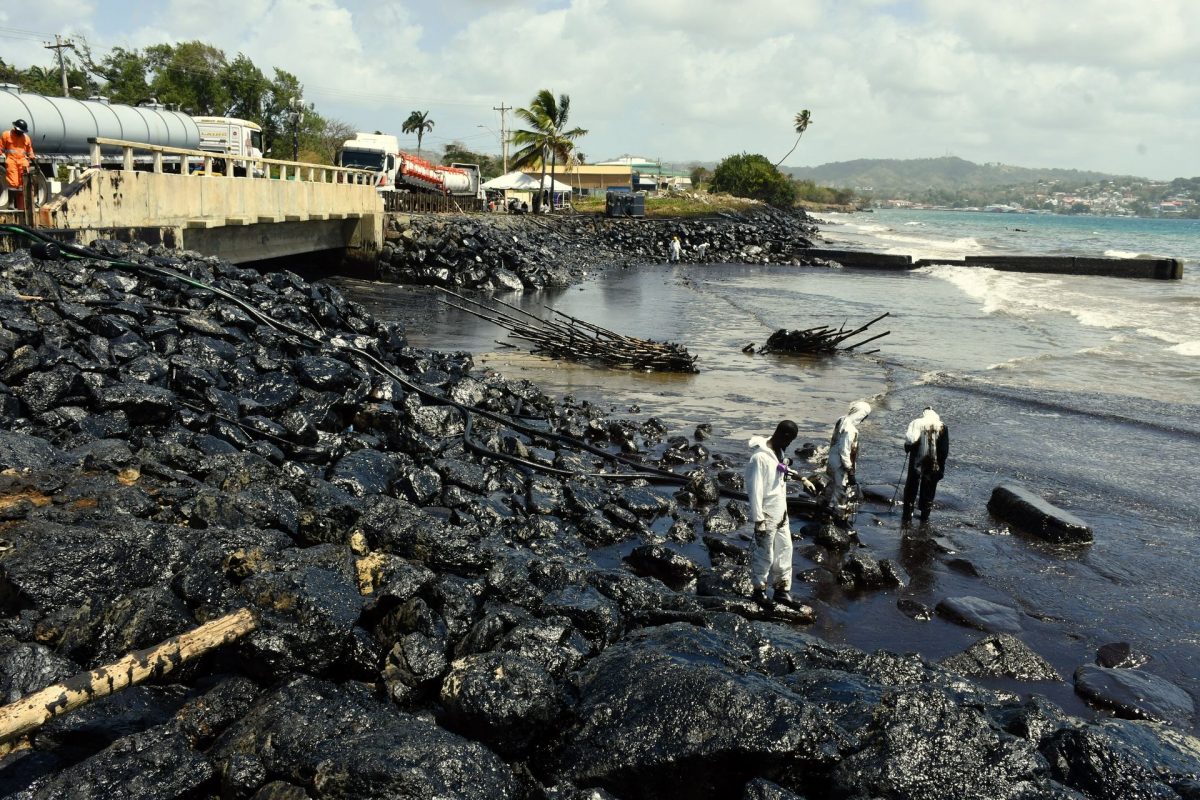(Trinidad Guardian) The Dutch Antilles, a trio of islands between 800 and 1,000 kilometres west of Tobago, are all on alert as oil from the Tobago oil spill created by the Gulstream barge drifts across the Caribbean Sea and their Bonaire government wants to take legal action against those responsible for the environmental disaster.
The spill, containing intermediate fuel oil or bunker fuel, first washed up on Tobago’s coastline on February 7, has travelled out of Trinidad and Tobago’s maritime waters towards Grenada and Venezuela over the last three weeks and first began affecting the eastern-most Dutch island of Bonaire on February 26.
Stichting Nationale Parken Bonaire, an environmental conservation organisation, has coordinated clean-up efforts in Sorobon, Lac and Lagun in Bonaire since February 26, and stated several dead fish have floated ashore on the island’s eastern coastlines.
Bonaire’s acting governor Nolly Oleana said at a media conference that efforts for the clean-up in the area of Lac and Sorobon are in full swing. She said these areas, vital for fisherfolk, businesses and tourists, will be prioritised. Oil has washed up periodically over the last week on the island’s eastern coastlines but has not made it to the dive sites and heavily trafficked tourist areas on the island’s western side.
Oleana has announced that a request has been submitted for military assistance on Bonaire.
“Military units will be deployed to assist in cleaning up the oil spill,” the acting governor said.
However, Oleana raised concerns about the possibility of further oil spilling in several inlets on the island and stressed the importance of swift action to prevent further damage to wildlife. A group of 15 soldiers from the Netherlands Ministry of Defense has been assisting in Foodies and Lagun, followed by Punto Kalbas and Mar Cultura, Bonaire.
Bonaire said it has been working with the Government of Trinidad and Tobago regarding compensation.
At yesterday’s media conference, she explained, “We are in contact with Trinidad and Tobago. Together, we do want to prosecute. A legal expert from the Netherlands is in contact with a lawyer from Trinidad and Tobago. That’s what they’re about. We both just don’t know who owns the ship yet. And we also don’t know who owns the oil product on the ship. Once this is known, follow-up steps will be taken.”
As clean-up efforts continue on the island, Judith Raming, the manager of Bonaire National Marine Park, said further clean-up efforts will continue with the support of the military but insisted that no support from volunteers is needed.
Curaçao, Aruba on alert
Curaçao’s Ministry of Health, Environment and Nature (GMN), in a statement, also said yesterday that multiple institutions are monitoring and have begun preparations to deal with “eventual sea pollution in northern/western parts of Curaçao” and “all maritime institutions are on a state of alert.”
The alert followed days after oil first washed up on Bonaire’s coastline.
However, GMN’s sector director, Gabriel Murray, said Curaçao does not have oil booms to close off the mouths of critical streams and bays.
In an interview with local media in Curaçao, he said the island still had to invest in booms and suggested that the oil is unlikely to come ashore. If it does, Murray said it will be removed manually with excavators.
Aruba, the furthest west of the Dutch Antilles, is also now on alert, as satellite imagery detected the oil from the Tobago spill drifting north of the island to drift across the southern Caribbean Sea.
The director of Aruba’s Crisis Management Office, Rino Hermans, said, “We have divided Aruba’s territory into four sections so each department is monitoring.”
He added that turtle nesting sites and tourist beaches will be protected.
The Aruba government said it plans to activate a 60-person team of first responders and a clean-up plan as soon as the oil spicks are visible near its shores, according to Hermans.
Hermans said Aruba’s government is ready to help Bonaire with clean-up and “human resources are needed, not equipment, in this phase.”






